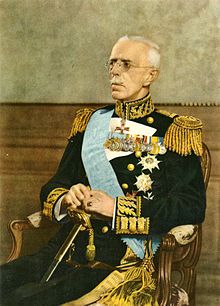Gustav V of Sweden
| Gustaf V | |||||
|---|---|---|---|---|---|
 |
|||||
| King of Sweden | |||||
| Reign | 8 December 1907 – 29 October 1950 | ||||
| Predecessor | Oscar II | ||||
| Successor | Gustaf VI Adolf | ||||
| Prime Ministers | |||||
| Born |
16 June 1858 Drottningholm Palace |
||||
| Died | 29 October 1950 (aged 92) Drottningholm Palace |
||||
| Burial | Riddarholmen Church | ||||
| Spouse | Victoria of Baden (m. 1881; her death 1930) |
||||
| Issue |
Gustaf VI Adolf of Sweden Prince Vilhelm, Duke of Södermanland Prince Erik, Duke of Västmanland |
||||
|
|||||
| House | Bernadotte | ||||
| Father | Oscar II of Sweden | ||||
| Mother | Sofia of Nassau | ||||
| Religion | Church of Sweden | ||||
| Full name | |
|---|---|
| Oscar Gustaf Adolf |
Gustaf V (Oscar Gustaf Adolf 16 June 1858 – 29 October 1950) was King of Sweden from 1907 until his death in 1950. He was the eldest son of King Oscar II of Sweden and Sophia of Nassau, a half-sister of Adolphe, Grand Duke of Luxembourg. Reigning from the death of his father Oscar II in 1907 until his own death 43 years later, he holds the record of being the oldest monarch of Sweden and the second-longest reigning after Magnus IV (Gustaf V was still the longest as an adult). He was also the last Swedish monarch to exercise his royal prerogatives, which largely died with him, although formally abolished only with the remaking of the Swedish constitution in 1974. He was the first Swedish king since the High Middle Ages not to have a coronation and hence never wore a crown, a tradition continuing to date.
Gustaf's early reign saw the rise of parliamentary rule in Sweden, although the leadup to World War I pre-empted his overthrow of Liberal Prime Minister Karl Staaff in 1914, replacing him with his own figurehead Hjalmar Hammarskjöld (father of Dag Hammarskjöld) for most of the war. However, after the Liberals and Social Democrats secured a parliamentary majority under Staaff's successor, Nils Edén, he allowed Edén to form a new government which de facto stripped the monarchy of all virtual powers and enacted universal and equal suffrage, including for women, by 1919. Bowing fully to the principles of parliamentary democracy, he remained a popular figurehead for the remaining 31 years of his rule, although not completely without influence – during World War II he allegedly urged Per Albin Hansson's coalition government to accept requests from Nazi Germany for logistics support, refusing which might have provoked an invasion. This remains controversial to date, although he is not known to have shown much support for fascism or radical nationalism; his pro-German and anti-Communist stance was well known also in World War I.
...
Wikipedia
